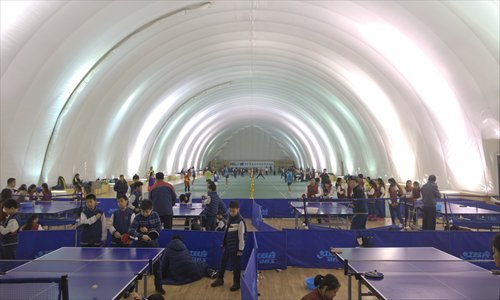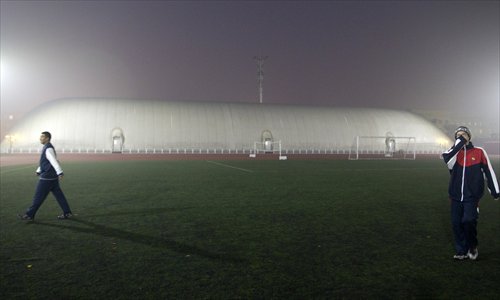HOME >> CHINA
One Beijing school allows pupils to stay home as smog chokes city
By Liu Xin Source:Global Times Published: 2015-12-2 19:43:01

Students play table tennis in a gas-filled membrane gymnasium built to protect them from air pollution in Beijing Haidian Foreign Language Experimental School on Tuesday. Photo: CFP

Two students walk outside the gymnasium. Photos: CFP
As heavy smog created doomsday-like scenes in Beijing this week, just one of the city's thousands of public schools recommended its students to stay at home.
The primary school allowed students to study from home to cope with the pollution that blanketed the capital from Saturday until Wednesday.
"Students who have someone to accompany them could choose to study at home on Tuesday. Those who do not have adults to take care of them still need to go to school and teachers will organize teaching activities for them," a teacher from Beijing No.2 Experimental Primary School told the Global Times on Tuesday.
Several teachers from other primary schools told the Global Times on Tuesday that the school was the only public school allowing students not to go to school under the orange air pollution alert that they had heard of, as many schools were reluctant to disrupt classes and parents' schedules.
Academic alert
The teacher from Beijing No.2 Experimental Primary School said that their decision was in accordance with the announcement made by Beijing Municipal Commission of Education, which requires schools and educational organizations to stop all outdoor activities and gives them leeway to adjust teaching activities according to the pollution situation.
The school administrators sent a message to parents on Monday night saying that as the hazardous air pollution in Beijing was forecast to continue and because it would be impossible to open the school's windows, air in the classrooms would undoubtedly grow stale and germs would spread, according to a report in Legal Mirror on Tuesday.
Another teacher from the school confirmed to the Global Times that only a few students attended classes on Tuesday.
The Beijing government issued an orange alert on Sunday, warning that the hazardous air pollution would continue until Wednesday and suggested the public take protective measures when engaging in outdoor activities and that those who suffer from respiratory diseases stay indoors.
China has a four-tier color-coded air pollution warning system, in which red represents the most severe pollution conditions, followed by orange, yellow and blue.
According to the Beijing Heavy Air Pollution Contingency Plan (Trial) announced in October 2013, a red alert means that the following three days are forecast to be severely polluted and all middle schools, primary schools and kindergartens should suspend classes.
A red alert has never been issued, despite several consecutive days of heavy smog being seen a number of times since 2013.
Solving the problem
"As far as I know, Beijing No. 2 Experimental Primary School is the only public school in Beijing to take such measures. Other schools just cancelled outdoor activities, like exercises during the break or physical classes," Xiao Meng (pseudonym), a primary school teacher in Beijing's Xicheng district, told the Global Times.
Suspending classes might disorganize regular teaching activities and affect students' schoolwork, said Xiao Meng, adding that this may be the main reason that most schools did not take action despite the pollution.
"It is impractical for schools to suspend classes regularly due to heavy smog, considering that heavy air pollution has become normal in Beijing in recent years," Nan Xi (pseudonym), the mother of a middle-school student told the Global Times.
Nan and her husband both have full-time jobs and no one will be at home to look after their daughter if the school suspends classes.
"It is considerate for schools to suspend class to protect students' health, but it also might bring troubles to parents," said Nan.
Often, parents prefer to send their children to school rather than leave them home alone even during times of hazardous air pollution, but some are trying to do something to protect the children's health.
According to Xiao Meng, two thirds of the parents in her classes agreed to pay for air purifiers to be installed in classrooms but the plan needs to be approved by the management of the school.
Both Xiao Meng and Nan expressed their worries about what they and schools can do to protect children from air pollution and said that they hope the government can tackle the smog problem.
Newspaper headline: Unhealty holiday
Posted in: Environment